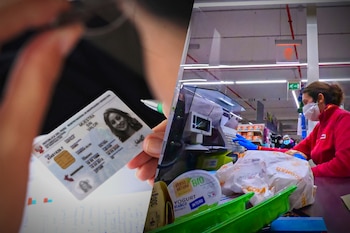
Those who are responsible for shopping for the home have witnessed these practices in some establishments located in the country, especially the supermarkets, these spaces that are visited daily by Peruvians and Peruvians, who come to buy the products to meet their needs.
After filling the shopping cart, we finish our activity by going to the checkout area, where we must deliver the products to the staff, cashier or cashier, so that they can tell us the amount to be paid for them. It is at this time, or even before, that the worker asks a seemingly harmless question: can you give me your ID number?
Sometimes out of trouble, or because we don't sense that something bad will happen, we immediately give these digits, which are recorded on the machine they use. If you're a curious consumer, you've probably wondered why they do it and what is the reason they require your National Identity Card number.
After reading this article, you will understand why you should be careful who you give this series of numbers that identify you in the national system to.

WHY DOES THE CASHIER ASK FOR YOUR ID NUMBER?
Those companies that ask their customers for the DNI number at the time of payment for their products would not be committing an illegal act, according to the explanation provided by the President of the Peruvian Association of Consumers and Users (ASPEC), Crisologo Caceres, to La República. This act does not go beyond the legal limits as long as the transaction carried out does not exceed 700 soles. If this is the case, if it is necessary for the person to identify himself or herself.
What happens if I buy products at a lower amount than stated above? If this is your case, and make the payment in cash, you are not obliged to provide your ID number.
WHAT DO THEY DO WITH YOUR ID NUMBER?
In an interview with ATV, the specialist indicated that “they ask for the DNI to draw consumption profiles. These companies begin to register that you periodically buy yogurt brand such or buy polos brand such. With that, they make a profile and start bombarding you by offering you that kind of product.”
It is important that you take into account the following, when giving these digits you don't know what or what they will use it for. Your ID can be used without your authorization to be sold to those companies that are responsible for setting up databases that are acquired and where they get the data from for the annoying so-called spam.
With your information they can also create profiles for advertising, telemarketing, creation of personal databases, and even be used for criminal acts, such as scams.

SO, WHEN DO I HAVE TO PRESENT MY DNI?
In the country there are some exceptions where you must provide this information, which are:
- When the total amount of the purchase exceeds the amount of S/700, as established by the Resolution of Superintendence No. 007-99 of the Sunat in paragraph 3.10. This rule provides for the need to record the identification data (first names, surnames and ID) of the customer.
- Did you know what... Consumers can also voluntarily provide their ID number when they want their consumption to be deducted from the payment of Income Tax.
- Workers of the fourth or fifth category, who consume in hotels, bars or restaurants and pay by registering their DNI or RUC, may deduct up to 15% of such consumption from the Income Tax. Taking as the maximum deduction ceiling in year 3 ITU, which is equivalent to S/13,800. It will only be applied to electronic receipts (POS ticket, electronic sales slip, electronic wallet ticket, electronic debit notes, among others). In areas where there is no internet signal, the physical ticket will be applied.
KEEP READING
Últimas Noticias
Debanhi Escobar: they secured the motel where she was found lifeless in a cistern

The oldest person in the world died at the age of 119

Macabre find in CDMX: they left a body bagged and tied in a taxi
The eagles of America will face Manchester City in a duel of legends. Here are the details

Why is it good to bring dogs out to know the world when they are puppies




